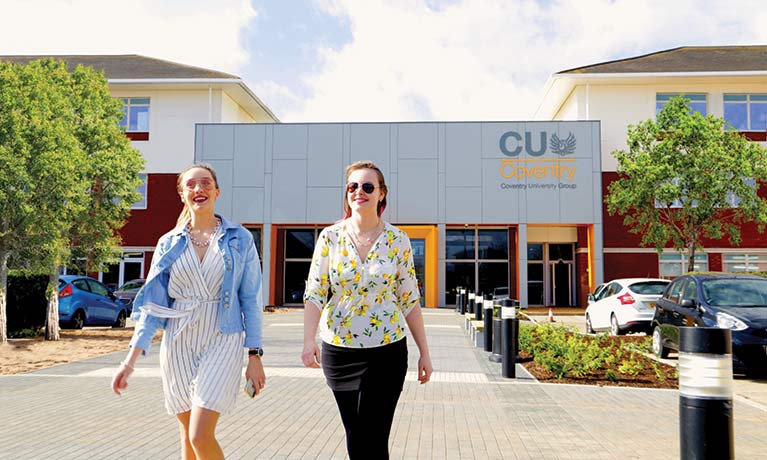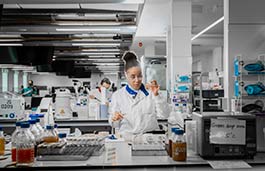Search
Nutrition and Health BSc (Hons) with foundation year
Study level: Undergraduate
This exciting degree explores the physiological, biochemical and psychosocial aspects of nutrition, as well as public health and health promotion.
Course option
Year of entry
Location
CU Coventry (Coventry) and
Coventry University (Coventry)
Study mode
Full-time
Sandwich
Duration
4 years full-time
5 years sandwich
UCAS codes
B4DF
Start date
September 2025
November 2025
The information on this page is for 2024-25 entry and should be used as guidance for 2025-26 entry. Please keep checking back on this course page to see our latest updates.
Course overview
Our degree with foundation year could be the stepping stone you need to achieve your goals. The foundation year aims to prepare you for degree-level study and is a great way to build the confidence, skills and knowledge needed to succeed on your degree course.
Foundation year
The foundation year course offers an introduction to your chosen subject and helps you develop the necessary skills for degree-level study. In addition, you will also explore key skills such as research methods, scientific fundamentals and promotion techniques.
Degree
The field of nutrition is growing in importance and graduates from this course will be able to access a wide range of career opportunities.
Nutritionists are needed to work with individuals, groups and communities, the food industry, regulatory bodies and policy makers to promote healthy diets and appropriate food choice.
- The course aims to draw on the expertise of academics from biological and analytical sciences and public health nutrition to provide an integrated course, centred on human nutrition and healthy eating, food safety and regulatory processes, food analysis and public health.
- You’ll have the chance to gain hands-on experience of a wide range of scientific techniques. Assessments are designed to mimic real-life scenarios, such as analysing nutrient intake from a food diary, developing dietary interventions and designing health promotion campaigns.
- Throughout the course, you will receive insight from researchers and current practitioners who will bring you the latest issues on a wide range of nutritional and health topics.
Joint Top Modern University for Career Prospects
Guardian University Guide 2021 and 20225 QS Stars for Teaching and Facilities
QS Stars University RatingsTop 5 UK Student City (Coventry)
QS Best Student Cities Index 2023Why you should study this course
Foundation year
- Supports you to gain the academic skills required for degree-level study.
- Provides a grounding in key areas of biosciences.
Degree
- No.7 for Food Science in The Complete University Guide 2023.
- Support applying for placements to gain crucial real-world experience2.
- Supported and taught by an academic team which includes registered nutritionists, food scientists, microbiologists, and food safety experts (staff may be subject to change).
- Gain hands-on experience of a wide range of industry techniques in our state-of-the-art laboratories based in the multi-million-pound Alison Gingell Building4.
Accreditation and professional recognition
The degree is accredited1 and recognised by the following bodies:
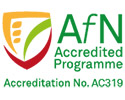
Association for Nutrition
Accredited by the Association for Nutrition. On successful completion of the course you are eligible to apply for direct entry to the UKVRN Register as a Registered Associate Nutritionist (ANutr) (additional costs may apply).
The Nutrition and Health course at Coventry University attracted me because of its focus on nutrition while touching on some food science topics that will help me as a nutritionist. My time at Coventry University equipped me with the required knowledge in Physiology and Biochemistry, Nutrition and Health, and Public Health Nutrition. Moreover, I learned multiple skills that proved to be beneficial when I started working on my dissertation where I am researching techniques that promotes weight loss maintenance.
Alfadhul Almubarak, Nutrition and Health BSc (Hons) current student, 2022.
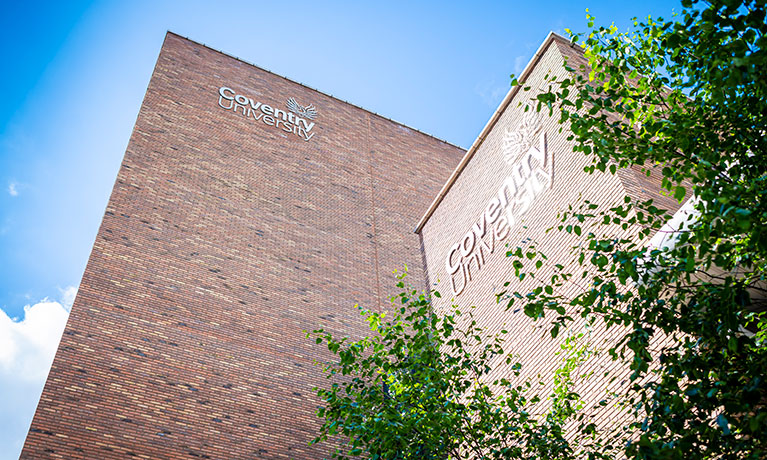
What you'll study
We regularly review our course content, to make it relevant and current for the benefit of our students. For these reasons, course modules may be updated.
I found the curriculum arrangement and teaching resources of Coventry University are excellent. Staff are very responsible and friendly and give me a lot of support. I also like the atmosphere of class, which involves lots of discussion. Overall, the experience of studying this course is amazing.
Nikki Li, Nutrition and Health BSc (Hons) current student, quoted in 2022.

How you'll learn
Staff from different professional backgrounds have integrated research and expertise to provide the students with an ever-engaging teaching and learning experience on product design, nutrition, and public health.
Dr Isabella Nyambayo, Assistant Professor, 2022.

I found the curriculum arrangement and teaching resources of Coventry University are excellent. Staff are very responsible and friendly and give me a lot of support. I also like the atmosphere of class, which involves lots of discussion. Overall, the experience of studying this course is amazing.
Nikki Li, Nutrition and Health BSc (Hons) current student, quoted in 2022.

Entry requirements
Typical offer for 2024/25 entry.
Got higher grades? Have you considered direct entry to the degree without foundation year?
Fees and funding
Foundation year
| Student | Full-time | Part-time |
|---|---|---|
| UK, Ireland*, Channel Islands or Isle of Man | 2025/26 fees TBC 2024/25 fees - £7,950 |
Not available |
| International/EU | Not currently available*** | Not available |
Degree
| Student | Full-time | Part-time |
|---|---|---|
| UK, Ireland*, Channel Islands or Isle of Man | 2025/26 fees TBC 2024/25 fees - £9,250 per year |
Not available |
| International/EU | Not currently available*** | Not available |
Please note: UK (home) tuition fees for the degree course years will be charged at the current Coventry University UK (home) degree fee level. This was set at £9,250 for the 24/25 academic year.
If you choose to do a work placement2, you should consider travel and living costs to cover this. There is also a tuition fee3 of £1,250 that will cover your academic support throughout your placement year.
For advice and guidance on tuition fees and student loans visit our Undergraduate Finance page and see The University’s Tuition Fee and Refund Terms and Conditions.
Tuition fees cover the cost of your teaching, assessments, facilities and support services. There may be additional costs not covered by this fee such as accommodation and living costs, recommended reading books, stationery, printing and re-assessments should you need them. Find out what's included in your tuition costs.
The following are additional costs not included in the tuition fees:
- Any optional overseas field trips or visits: £400+ per trip.
- Any costs associated with securing, attending or completing a placement (whether in the UK or abroad).
*Irish student fees
The rights of Irish residents to study in the UK are preserved under the Common Travel Area arrangement. If you are an Irish student and meet the residency criteria, you can study in England, pay the same level of tuition fees as English students and utilise the Tuition Fee Loan.
**This course with foundation year is not currently available to international students. If you do not meet the entry requirements to directly join year 1 of the degree, please take a look at our International Pathways Programme for additional options.
Facilities
Our foundation years are taught at CU Coventry’s Mile Lane building, a short walk from the city centre. You’re part of the university from day one, so during your foundation year you’ll have access to the wider facilities at Coventry University. Once you successfully complete your foundation year, you'll transfer over to studying your chosen degree at Coventry University, where you'll be taught on campus in the relevant academic buildings.
Careers and opportunities
You will be taught in a variety of settings, including laboratories and a purpose-built kitchen, so that you have the chance to develop the analytical and practical skills required by employers – working with accuracy and precision to obtain data and results.
Where possible, coursework uses applied tasks that mimic the skills needed in jobs to help ensure you are attractive to potential future employers, such as collection and interpretation of nutritional data to assess nutrient intake from a food diary, or critically appraising evidence to inform the public of current nutrition and health topics. We also offer the opportunity for industry visits and fieldtrips2, which have previously included trips to a local food bank and conferences such as Food Matters Live.
You will also have support with applying for short and long-term placements to gain the experience employers desire. Past students have undertaken one-year placements in the food industry with organisations such as Coventry City Council and Public Health England2.
The Talent Team can help you to find suitable work placements and give you advice on how to get the most out of them.
The need for nutritionists is growing with the increasing incidence of diet-related health conditions such as obesity, heart disease, type 2 diabetes and cancer.
Consequently, graduates from this course should be well equipped for a wide range of roles in the field of nutrition and health – from working on emergency relief projects in low income countries to devising health initiatives to target dietary intakes of specific groups, such as pregnant women, school children and the elderly.
Opportunities may exist within local authorities, charitable organisations, the NHS, parenting organisations, health promotion, and the food and leisure industries. You could also find yourself advising policy makers, regulatory bodies or working in education or the media.
You will be strongly encouraged to take a year out by applying for a work placement or completing a summer internship2.
Where our graduates work
Our graduates have secured roles in companies including the Health Security Agency, NHS, Mondelēz International, PURE International and Healthy Lifestyles Coventry, among others.
Further study
The course is an excellent foundation for further postgraduate studies leading to an MSc or PhD.
The prospect of becoming a nutritionist has long been a career goal of mine, with a particular interest in the relationship between food, healthy lifestyle, and personal wellbeing. I chose to study Nutrition and Health at Coventry University because the university has the most modern facilities (including high-tech laboratories and experiential learning areas), which help you to excel in your studies. Additionally, the staff and the university offer outstanding support. I have never felt alone! My academic tutors were extremely approachable and keen to engage with their students.
Margherita Porro, Nutrition and Health BSc (Hons) graduate, quoted in 2022.

How to apply
You may also like
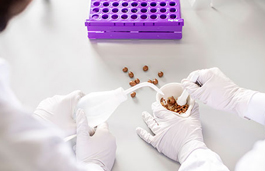
Food Science BSc (Hons)

Food Control CertHE

